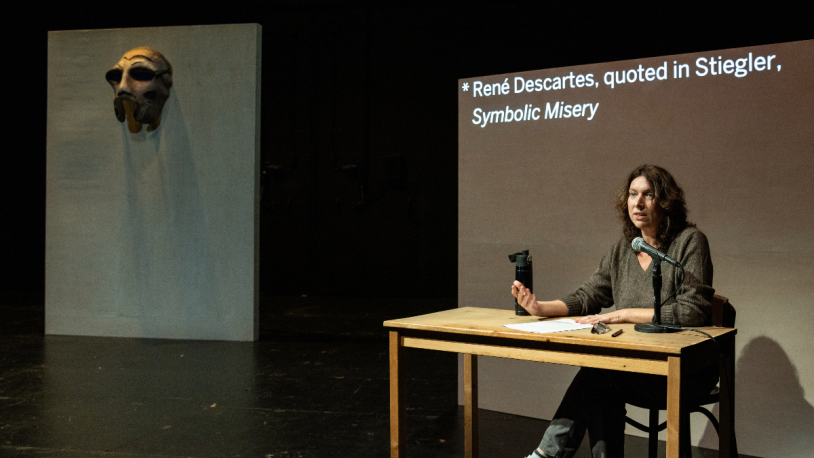“Quiet, where need is; and talking to the point.”
That is the only surviving scrap of dialogue from Aeschylus’s Prometheus Firebringer, the final play in a trilogy about the mortal’s battle with Zeus of which only the first work, Prometheus Bound, survives in full. It’s also a fitting description of Annie Dorsen’s provocative and thoughtful new solo show Prometheus Firebringer, which opened Tuesday at the Theatre for a New Audience space in Brooklyn.
While Prometheus was punished for stealing fire for humanity and introducing arts and culture to the world, Dorsen centers her work on a new form of technology that threatens to disrupt both the arts and humanity itself: artificial intelligence. In this case, she has taken the predictive text algorithm GPT-3 (the same program that runs ChatGPT) to create new versions of Prometheus Firebringer based on what scholars suspect is contained in the long-lost text from the 5th century BCE. We hear digitized AI-generated voices reciting lines by both a chorus of orphaned children, rendered on stage as masks resting on top of mic stands of varying heights, and Prometheus, a single mask with video-screen eyes hung on a blank wall at center stage.

It’s a mesmerizing and unsettling re-creation, one that’s amplified by an additional screen where another algorithm spews 100-word summaries of the text in varying degrees of plausibility. And it’s a fitting representation of how far technology has come, and how the gap between the ancient and the modern is not so wide as we might think.
Dorsen supplements this otherworldly performance with a monologue-cum-lecture, a seated TED talk on the subject of AI made up entirely of quotations lifted verbatim from other texts, with the sources helpfully and hilariously projected onto a wall behind her, downstage left. Her citations range from Descartes, Roland Barthes and Susan Sontag to The Twilight Zone, Barbara Bourland’s I’ll Eat When I’m Dead and random Twitter accounts. The selection sometimes produces hilarious juxtapositions, as when she cites a theater guide for teenagers for the telling admonition: “Contrary to popular decree, there is such a thing as a ‘bad choice.'”
Taken altogether, Dorsen makes a compelling case for the power of AI as both an innovative tool as well as a potential threat. Her show reflects that fundamental tension within just about every breakthrough technology, drawing us in even as it upends our deeply held convictions. She honors the essence of her source material: She talks to the point, but where needed, allows silence for us to collect our thoughts.

